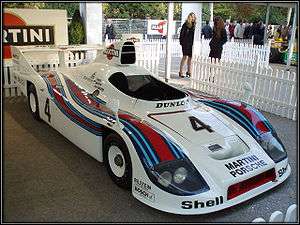Porsche 936

The Porsche 936 was a Group 6 Two-Seater Racing Car introduced in 1976 by Porsche as a delayed successor to the 917, a five litre Group 5 Sports Car, and the 908, a three litre Group 6 Prototype-Sports Car, both of which were retired by the factory after 1971. Its name came from using a variant of the Porsche 930's turbocharged engine, as well as competing in Group 6 racing.
History
The Porsche 936 was built to compete in the World Sportscar Championship as well as at 1976 24 Hours of Le Mans under the Group 6 formula, which it won both of. Chassis 002 with #20 won with Jacky Ickx and Gijs van Lennep won Le Mans, while the #18 chassis 001 of Reinhold Joest and Jürgen Barth had engine failure. It shared these victories with its production-based sibling, the Porsche 935 which won in Group 5. The open top, two seater spyder was powered by an air-cooled, two-valve 540 hp (403 kW) single-turbocharger flat-6 engine with 2140 cc, or the equivalent of 3000 cc including the 1.4 handicap factor. The spaceframe chassis was based on the 917, with many of the parts also coming from the car. In the first outings, the Martini Racing car was still black,[1] and the engine cover behind the roll bar was flat. The large hump and the air box above the engine was fitted onto the car later in the season. It is not for the air intake of the turbocharged engine, nor for cooling of the air-cooled engine itself, but instead mainly used for the intercooler.
From 1976 to 1981, the factory entered Porsche 936 won the 24 Hours of Le Mans three times with Jacky Ickx ('76, '77, '81), thus each of the three original chassis won once. In 1978, the two previously winning chassis, which had been updated for 1977, came second and third behind the Renault, while the pole-setting new chassis 003 crashed out. Porsche did not intend to sell the 936 to customers, wanting them instead to use the 935 (which occupied the first four places at Le Mans in 1979), and the old 908 which were still around, updated to turbo engines and new 936-like aerodynamics. In 1979, a half-hearted Essex-sponsored Le Mans entry with two 936 was a failure, and the car also crashed[2] at Silverstone. Porsche, wanting to test a new engine for the 956 pulled a few 936's out of the Porsche museum in Stuttgart, redesigned the car and entered as an official works entry for the 1981 Le Mans 24 Hours, coaxing Jacky Ickx out of retirement, and at the Belgian's request having Briton Derek Bell as his teammate for the race, which needless to say they won. Porsche engineers provided some unofficial support to very good customers, though, and Joest managed to get a spare chassis (004) and parts to assemble a car which was in 1980 designated as Porsche 908/80 and entered privately by Joest Racing. The Martini Racing Liqui Moly backed car took second at Le Mans in 1980. Kremer received blueprints to recreate a modified '81-spec car dubbed chassis 005 for 1982.
The successor Porsche 956 was introduced in 1982 after the new 2650 cc engine designed for Indycar was tested in the 1981 winning chassis 003 which was sponsored by Jules, a Christian Dior fragrance for men. At the inaugural year of the new Group C formula which the 956 was built for, privateer teams such as Kremer Racing and Joest Racing had to wait until 1983 for their 956. Thus, in an attempt to conform to the new Group C regulations, both teams built new bodyshapes that incorporated a roof onto their 936-replicas. Joest's car was designated as 936C JR005 while Kremer's car became known as the CK5 01.
Literature
- Lothar Boschen/Jürgen Barth: Das große Buch der Porschetypen, Motorbuch Verlag, Stuttgart 1994, ISBN 3-613-01284-7
- Schneider, Peter: Typenkompass Porsche. Renn- und Rennsportwagen seit 1948, Motorbuch Verlag, Stuttgart 2003, ISBN 3-613-02300-8
References
- ↑ "Porsche 936/76 ‘Black Widow’ - Heritage models - Model cars - Porsche Design Driver`s Selection". Shop1.porsche.com. Retrieved 2010-11-28.
- ↑ Bruce Jones: And They Walked Away!: The B-I-G Accidents and the Drivers Who Lived to Tell the Tale
External links
- Porsche: 1976 - Porsche 936 Spyder
- Porsche: 1981 - Porsche 936/81 Spyder
- http://www.ultimatecarpage.com/car/424/Porsche-936.html